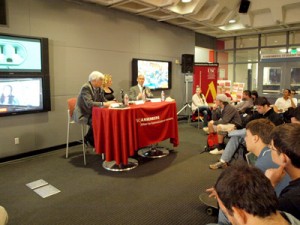Obama addresses future of education
President Obama outlined his plan to prepare America for the future in his second State of the Union Address Tuesday night.
Obama conceded that the future would present challenges for America, but that Americans should embrace these challenges.
“The world has changed. The competition for jobs is real. But this shouldn’t discourage us,” Obama said. “It should challenge us.”
The first part of the President’s plan for the future is centered on education.

Speak out · Dan Schnur (right), the director of the Jesse M. Unruh Institute of Politics, speaks at a panel discussion in the Annenberg East Lobby before Obama’s State of the Union Address last night. - Sunil Murali | Daily Trojan
Obama called for parents to pay a more integral role in their children’s education.
“We need to teach our kids that it’s not just the winner of the Super Bowl who deserves to be celebrated, but the winner of the science fair; that success is not a function of fame or PR, but of hard work and discipline,” Obama said.
A key component of Obama’s education plan is the replacement of the No Child Left Behind Act with a policy that focuses more on children at a local level.
Obama called Race to the Top, a program that awards schools with the highest quality teachers and student achievement, “the most meaningful education reform of the last century.”
The President promised that by the end of this decade, America will once again have the largest proportion of college graduates in the world through increased financial assistance from the government.
Obama also announced that the children of illegal immigrants studying at American universities and colleges should not be deported.
“[Children of illegal immigrants in college] grew up as Americans and pledge allegiance to our flag, and yet live every day with the threat of deportation,” Obama said. “Let’s stop expelling talented, responsible young people who can staff our research labs, start new businesses and further enrich this nation.”
The second part of Obama’s plan to prepare America for the future is tackling the nation’s rising debt.
“Every day Americans sacrifice to live within their means,” Obama said. “They deserve a government that does the same.”
The President proposed a plan that would freeze all non-security related, domestic spending for the next five years, which would eliminate the deficit by $400 billion in the next 10 years.
In addition Obama promised to restructure the federal government as a cost saving measure.
“We live and do business in the information age, but the last major reorganization of the government happened in the age of black-and-white TV,” Obama said. “In the coming months, my administration will develop a proposal to merge, consolidate and reorganize the federal government in a way that best serves the goal of a more competitive America.”
The President also pushed a new clean-energy agenda, which calls for America to have the most electric cars on the road of any country by 2050 and to have 85 percent of America’s electricity come from clean energy sources by 2035.
The Jesse M. Unruh Institute of Politics held a discussion panel in the Annenberg East Lobby prior to the State of the Union Address to discuss cooperation throughout the federal government.
Kate Mather, a panelist at the discussion and former editor-in-chief of the Daily Trojan, talked about how Obama’s move to the center is crucial for his re-election bid.
“Because Republicans were so successful in November, Obama was forced to move back to the middle,” Mather said. “He does have to start thinking about re-election, so he has to walk a balancing act, but at the same time he needs to also reach out to Republicans.”
Republicans, including Alexandra Russo, president of USC College Republicans, saw Obama’s shift to the center as a political ploy.
“A lot of [Obama’s] points were aimed more at moving his character to the center in light of his upcoming re-election,” Russo said. “He spoke about issues that are typically considered conservative such as cutting federal spending and restructuring federal government, in order to appeal to independent voters.”
Victoria Hallebo, an officer in USC College Democrats, also observed Obama’s shift to the center, but supported his proposed education and infrastructure policies.
“His speech was pretty central,” Hallebo said. “But I agree with his focus on education and infrastructure through technology and innovation.”
Madeline Lansky, a sophomore majoring in political science, applauded Obama’s new education policy and efforts to eliminate earmark spending.
“I like that he took bold stands and I agree with what [Obama] said about education starting in the home,” Lanksy said. “I also am happy [Obama] took a stance against earmarks, he’s extending an olive branch to Republicans.”
Correction: 1/26/11: A previous version of this story identified Kate Mather’s quote as “He does have to start thinking about re-election, so he has to walk a balancing act, but at the same time he needs to also walk out to Republicans.” Mather actually said Obama has to “reach,” not “walk” out to Republicans. This version of the story has been corrected to reflect the change. The Daily Trojan regrets the error.
